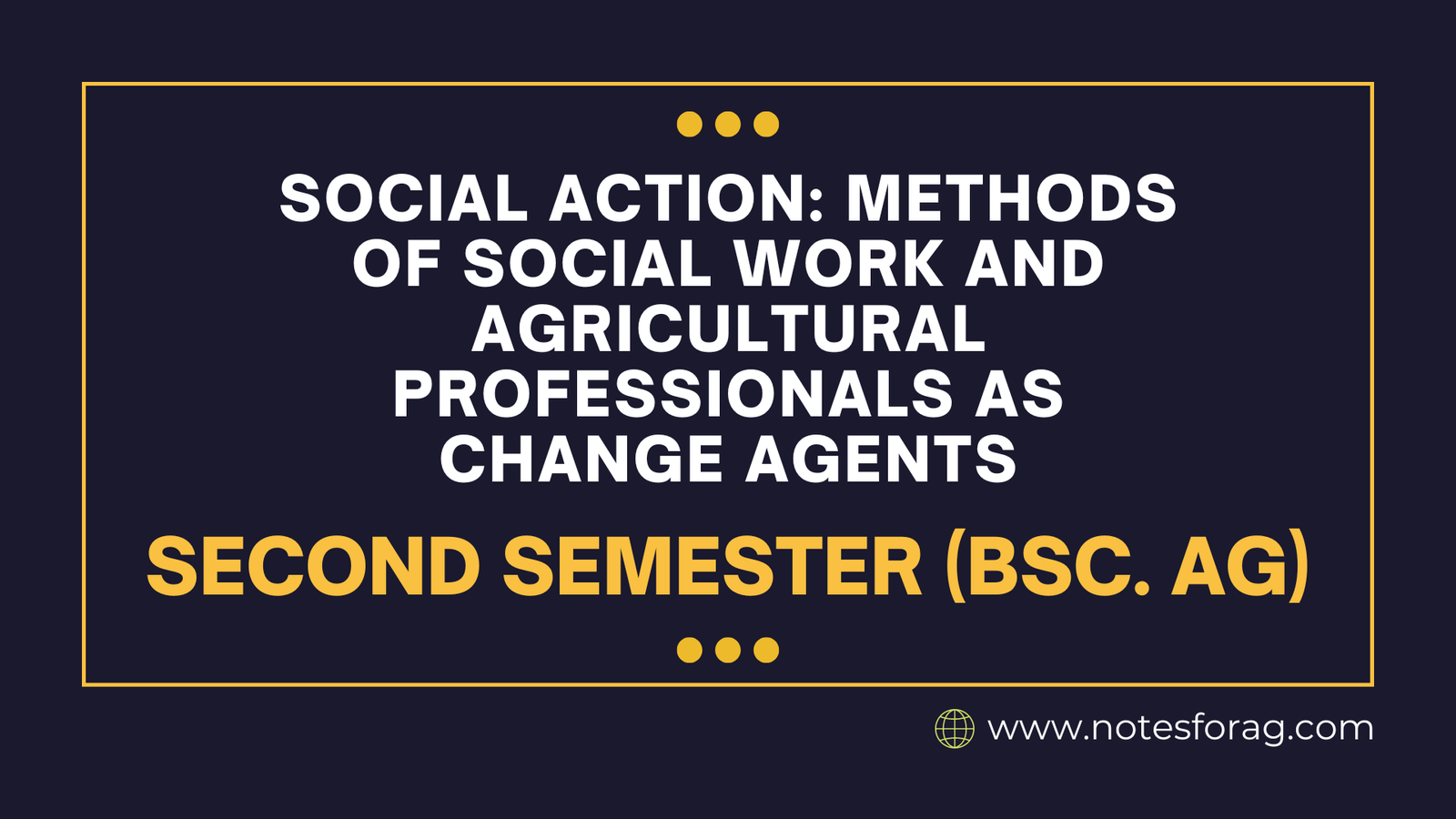Social action entails concerted efforts to address systemic problems, promote community welfare, and effect social change. Social workers and agricultural professionals use different strategies to act as change agents in this situation. Social workers address social injustices and improve the lives of marginalized groups through community organizing, advocacy, and empowerment techniques. Contrarily, agricultural professionals promote agricultural policies that aid in rural development, carry out sustainable farming methods, and inform communities about food security. They combine social and agricultural interventions to enable comprehensive and long-lasting community transformation.
Table of Contents
Introduction to Social Action

Social action involves concerted efforts to create social change and improve community well-being. As change agents, social workers and agricultural professionals employ distinct yet complementary methods.
The world faces a multitude of complex challenges, from social inequities and food insecurity to environmental degradation. Addressing these issues requires a multi-pronged approach, and within this landscape, social workers and agricultural professionals emerge as powerful change agents. While their areas of expertise may seem distinct, both fields share a core mission: empowering individuals and fostering positive change.
This essay explores the methods that social workers and agricultural professionals can employ to drive social action and create a more just and sustainable future. It also delves into the importance of collaboration between these two professions and the challenges they face in their pursuit of social change.
Social Workers
Social workers are at the forefront of social action, advocating for individuals and communities facing hardship. Their skill set equips them with a variety of methods to create positive change:
- Community Organizing: Social workers are adept at facilitating the formation of community groups, bringing people together to identify and address shared concerns. These groups can advocate for a wide range of issues, from access to healthy food and affordable housing to improved rural development programs. By fostering collaboration and a sense of collective agency, social workers empower communities to become active participants in shaping their own destinies.
- Policy Advocacy: Social workers are not simply confined to direct service. They can leverage their research skills and understanding of social issues to develop policy proposals that address systemic problems. This involves lobbying legislators and government agencies for changes that benefit their clients and communities. For example, a social worker may advocate for policy changes that expand access to mental health services in rural areas or increase the minimum wage for agricultural workers.
- Public Education: Raising public awareness about social issues is crucial for mobilizing support for change. Social workers can utilize a variety of tools, such as workshops, media campaigns, or community events, to educate the public and build understanding. This could involve raising awareness about food deserts, the plight of undocumented farmworkers, or the importance of mental health resources in rural communities. Educating the public not only empowers individuals to make informed choices, but also cultivates a climate where policy changes are more likely to receive support.
- Direct Service with a Social Justice Lens: Social work practice goes beyond merely providing individual assistance. Through a social justice lens, social workers integrate the fight for systemic change into their everyday work. This involves connecting clients to resources while also advocating for broader policies that address the root causes of poverty, hunger, and social inequities. For instance, a social worker might help a family access food assistance programs while also advocating for increased funding for school lunch initiatives in their community.
Agricultural Professionals: Cultivating a Sustainable Future
Agricultural professionals play a critical role in ensuring food security and fostering environmental well-being. Their expertise in agricultural practices can be harnessed to promote social change:
- Sustainable Farming Practices: Conventional farming methods often have detrimental impacts on the environment. Agricultural professionals can advocate for and promote sustainable practices like crop rotation, water conservation techniques, and the use of organic fertilizers. This not only protects the environment for future generations but also contributes to healthier food production and fosters more resilient agricultural systems.
- Local Food Systems: Building robust local food systems can contribute to food security, improved nutrition, and economic development in rural communities. Agricultural professionals can play a key role by supporting the development of farmers markets, community supported agriculture (CSA) programs, and infrastructure for local food storage and distribution. This not only benefits local farmers and consumers but also contributes to a more sustainable food chain with a reduced carbon footprint.
- Agricultural Education: Empowering farmers and consumers with knowledge is essential for creating a more sustainable food system. Agricultural professionals can provide valuable educational resources about responsible agricultural practices, the importance of healthy soil health, and the benefits of local food production. This not only helps farmers improve their yields and profitability but also educates consumers about the choices they make when buying food.
- Advocacy for Fair Farm Policies: The economic realities of agriculture often disadvantage small and family farms. Agricultural professionals can advocate for policies that support fair pricing for agricultural products, ensure fair labor practices for farmworkers, and promote sustainable land management practices. By advocating for fair policies, agricultural professionals can contribute to a more equitable agricultural sector and a healthier food system.pen_spark
Frequently Asked Question(FAQ)
What is social action?
Organizing initiatives to confront social problems and push for reforms that will enhance community well-being is known as social action. In order to combat injustices and advance social justice, it requires teamwork.
How do social workers contribute to social action?
Social workers make a difference by promoting legislative changes, uniting communities, offering guidance and assistance, informing people of their legal rights, and putting them in touch with necessary services and resources.
Related Articles

